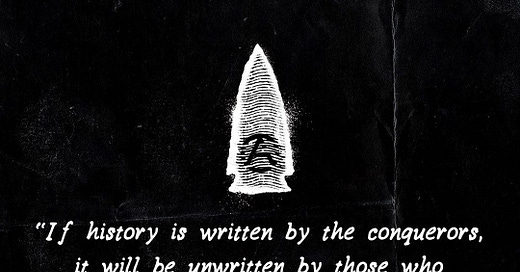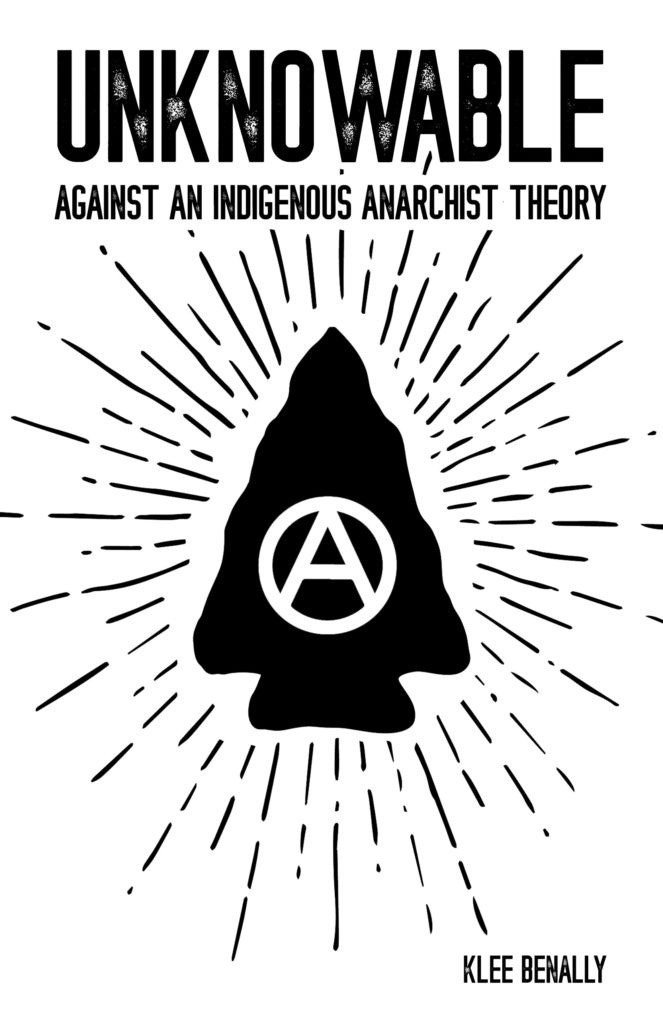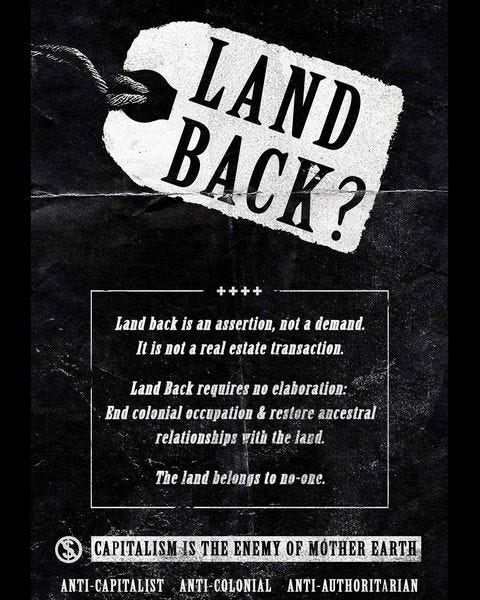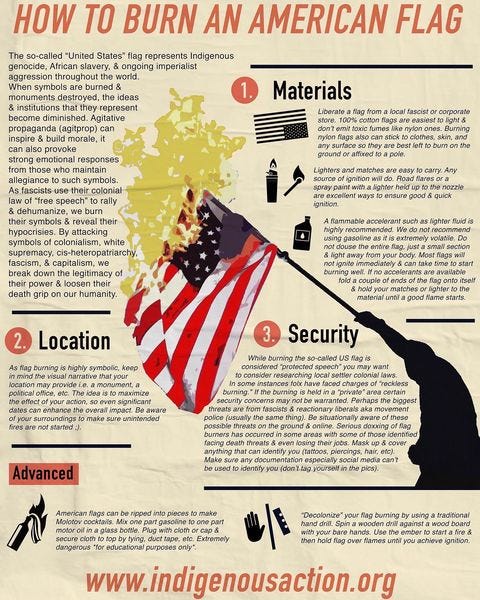"Ours is a radical incoherence"
Quotes and connections from Unknowable: Against an Indigenous Anarchist Theory, a zine by Diné artist, land defender and agitator Klee Benally (1975-2023)
Klee Benally (he/they) was an Indigenous (Diné) anarchist, musician, artist, writer, filmmaker, agitator, environmentalist and land defender. They are survived by his wife Princess, his sister Jeneda and brother Clayson, and their parents, Jones Benally and Berta Benally. Debra Krol at AZCentral has written a more in-depth profile on the life of this “uncompromising” artist and activist, here.
Klee’s family invites friends and community to a celebration of his beautiful life, this Saturday January 6 at 2pm, Orpheum Theatre - 15 W Aspen Ave, Kinłání, Occupied Territories (Flagstaff, AZ 86001). Masks required. They are asking for donations of warm gear to carry on Klee’s work for unsheltered relatives: men’s coats, size L and up, blankets, warm headgear, etc.
Donations are also being accepted for family and burial expenses, Táala Hooghan and HaulNo!.
…an Anarchist would pronounce, “There is no authority above yourself.”
An Indigenous Anarchist would offer, “There is no authority but nature.”
—Klee Benally, Unknowable: Against an Indigenous Anarchist Theory
Unknowable: Against an Indigenous Anarchist Theory Klee Benally, Ya’iishjááshch’ilí (June 2021) Originally published in Black Seed: Not On Any Map
★ You can read this zine in full online here. In this post, I will be highlighting those quotes and notes in this dense reading that stand out so starkly in this moment of many genocides and colonial death projects, interspersed with some of Klee’s beautiful artwork.
We have become entangled in words that are not our own. They cut our tongues as we speak. They eat our dreams as we sleep. This is a reluctant offering.
— Klee Benally
Civilization has no relatives, only captives. Breathing dead air and poisoned water, it owns the night and creeps towards distant constellations. Its survival is expansive unending hunger, a hunger that has been named colonialism; a vast consumption that feeds on spirit, and all life. It fashions its years and seconds into an anemic prison. It has shaped time into the most exquisite of weapons, obliterating memories, killing cycles. Its essence is time. The temporal and spacial imposition of awareness is the oblivion that is modernity and linear, or one-way time. When we name the genocidal fulfillment of a colonized future, civilization pronounces itself as The Existent. This is what is meant by “modernity.” It is authoritarian temporality. We name this consuming of existence, this assertion of “superiority,” as a war of wars against Mother Earth.
—The Unraveling
This is the etymology of colonialism; it is the language of domination, coercion, control, exploitation, assimilation, and annihilation. It expands and contracts in between breaths of unending wars, it colonizes memories to justify itself, this is what it calls History. Its corroded conscience constructs a national identity out of its insecurities: stories of greatness, of the world before and the world to come. It emerges entitled and assembles against its persistent enemies, the menace of those who refuse captivation, those fluctuating threats it names as “others.”
The maintenance of this internalized violence is its nationalism. When it becomes so pervasive that it has no need to pronounce its dominance and authority, this is what we also call “fascism.”
—Civil (Dis)Agreements
Our existence is organized in cycles that have rejected coercion into the static geography of settler-colonial understandings. We find more affinity with the juniper and sage that grow through impossible sandstone. We locate ourselves in the springs where our ancestor’s footprints have worn a path like an umbilical cord. We know the land and the land knows us. Where and who we are mean the same thing. This is an understanding that is cultivated through generations upon generations of mutuality. This is where our thinking comes from. It is a place where no government exists. Indigenous liberation is the realization of our autonomy and mutuality with all life and the Earth, free from domination, coercion, domination, and exploitation. This is also an anarchist assertion, so we locate a connection.
—Nature negates the state.
“Anarchism is the term used to describe an open ended theory that will not be set in stone. Anarchy isn’t named after a man, it is named after negation.”
—Aragorn!, Locating an Indigenous Anarchism
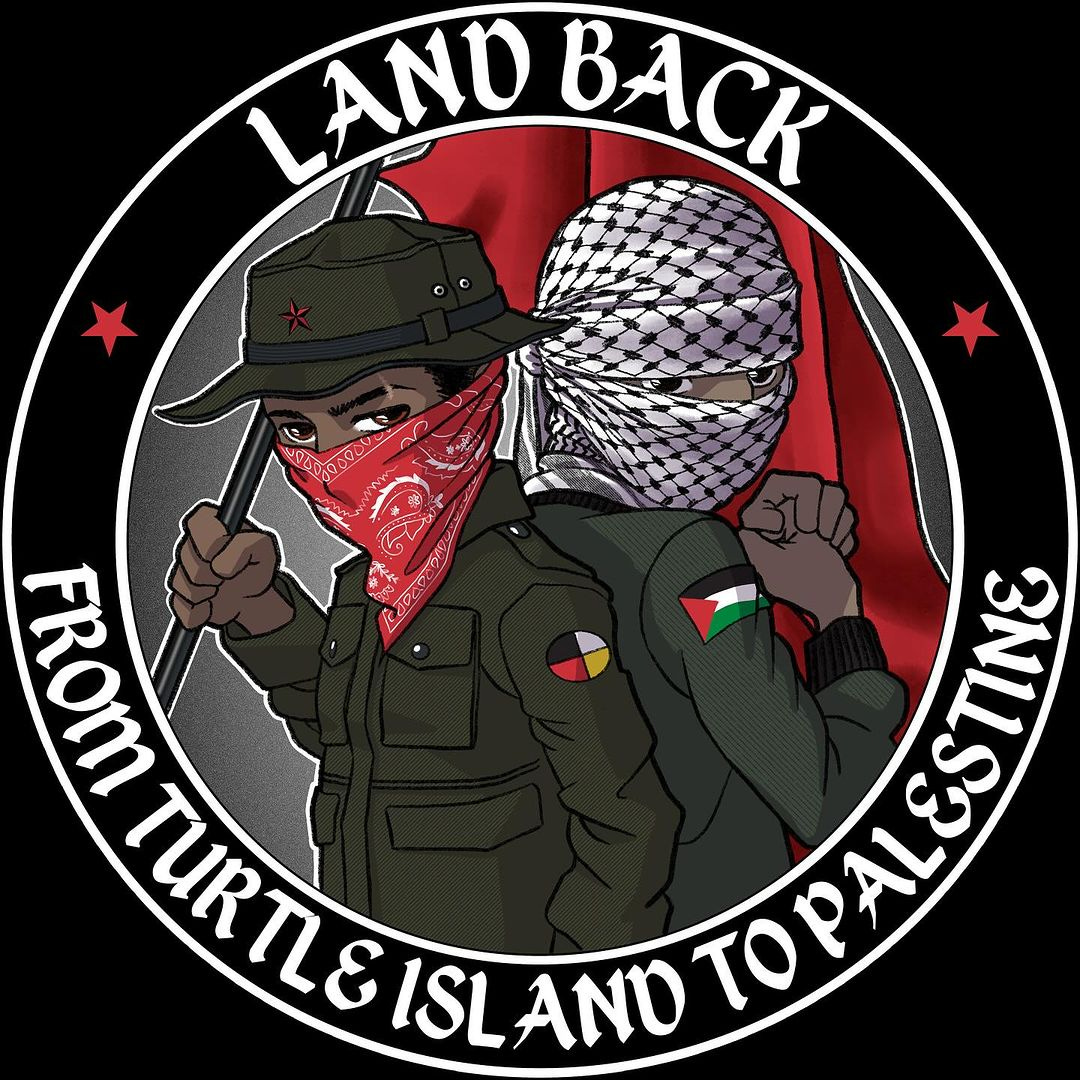
“Anarcho-Indigenism” [as] “…strategic commonalities between indigenous and anarchist ways of seeing and being in the world: a rejection of alliances with legalized systems of oppression, non-participation in the institutions that structure the colonial relationship, and a belief in bringing about change through direct action, physical resistance, and confrontations with state power.”
—Taiaiake Alfred, Wasàse: indigenous pathways of action and freedom (2005)
We anticipate the deeper exploration of Indigenous Anarchism to go two ways: one way will be by activist scholars (both Indigenous and settlers) from an anthropological and philosophical perspective that is totally out of touch with those closer to the fires of autonomy in our lands (and clearly this is the path we reject), the other way will be messy, bold, fierce, experimental, full of contradictions. It will be shared in smoke around fires, speaking dreams. It will be found between shutting down pipelines, smashing corporate windows, and ceremonies. It will be in hooghans and trailer parks. It will be something that refuses with all its being to be pinned down, to be brought into the folds of the knowable, to be an extension of the colonial order of ideas and existence. It will make itself unknowable.
—Dislocating an Indigenous Anarchism
This is also a negation of settler impositions and social mappings of gender, gender roles, ability, who is and who isn’t Indigenous, borders, religion, tradition (as a temporal constraint and not the in living cultural sense of the term), education, medicine, mental health, and so forth.
[…]
In this way we view anarchism as a sort of dynamic bridge. A set of radical (as in total negation) ideas that are a connecting point between anti-colonial struggle and Indigenous liberation. A practice that expresses and asserts autonomy in respect to the context of where it is located (place). It is an antagonistic connection between the point of where we are dispossessed and ruled over, to a point towards liberation and autonomy. As a rejection of all systems of domination and coercion, it is the utility anarchism has for Indigenous liberation of which we are interested in. And most specifically, it is in its indictment of the state and total rejection of it that we find the greatest use. Indigenous anarchism is a commitment to the destruction of domination and authority, which includes colonialism, white supremacy, cis-heteropatriarchy, capitalism, and the State.
—An Ungovernable Force of Nature.
The notion of life without authoritarian constraint doesn’t belong to a group because it found itself in compounded utterances of dead greek words, nor does it due to the succession of thinkers and practitioners in its beautiful and troubled genealogy. It belongs to no one and thus to everyone. It has been on the tips of our tongues so long as anyone has tried to dominate, control, and exploit our being and others. It has flowed from our thoughts and contracted our muscles to reflexively pull or push back
—An Ungovernable Force of Nature.
Civilization and the state are myths colonizers keep telling themselves and forcing others to believe. It is their ritual of power, their prayer is time. The settler imaginary, the civilized mind, is always haunted by everything in them that they have killed. Their State, their entire civilization, exists on the precipice of rupture. Their instability is possibility that can be made to spread. When their spirit is attacked and corrupted, they fail. When we shed the language of non-violence and embrace our dispossession, it becomes more clear how to precipitate that vital failure. When their imaginary cannot justify itself against its brutalities, it becomes so vicious and fearful that it attacks and consumes itself.
The myth ends in powerful unraveling disbelief.—The Re-Bundling/Weaving Again
Thank you a thousand times, Klee, for your radical and necessary wisdom, art, and music, and your relentless fight for anti-colonial justice 🕯
Klee’s important work lives on in the writing, art and projects they leave behind.
His book No Spiritual Surrender: Indigenous Anarchy in Defense of the Sacred is “a searing anti-colonial analysis rooted in frontline experience…[which]unrelentingly agitates against colonial politics towards Indigenous autonomy and total liberation of Nahasdzáán (Mother Earth)”. It is currently out of stock but will be reprinted as Klee’s community deals with their loss.
You can also buy Klee’s game Burn The Fort, “a semi-cooperative game [of Indigenous resistance] where you’ll face history in challenging & empowering ways”.

